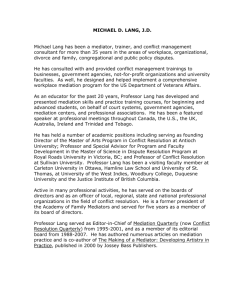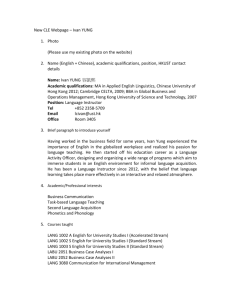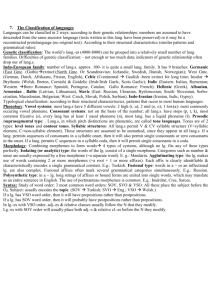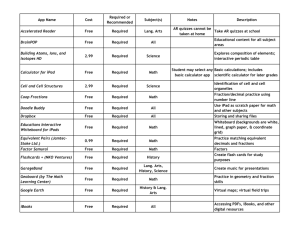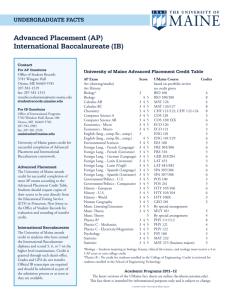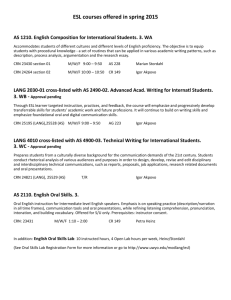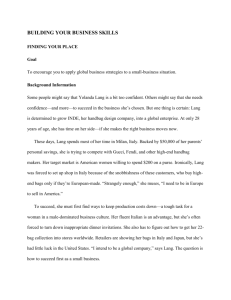AP Language and Composition
advertisement
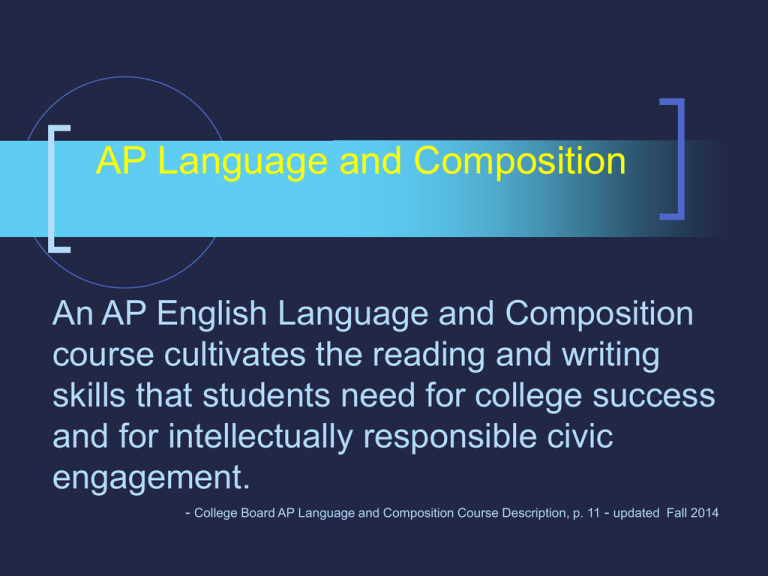
AP Language and Composition An AP English Language and Composition course cultivates the reading and writing skills that students need for college success and for intellectually responsible civic engagement. - College Board AP Language and Composition Course Description, p. 11 - updated Fall 2014 The primary goals of the course are: Developing Critical Literacy – Strengthen and cultivate critical skills essential to meet literacy challenges in college-level study across the undergraduate curriculum. Facilitating Informed Citizenship – Beyond their academic lives, students should be able to use the skills practiced in this course for responsible engagement in civic life. Immediate relevance of taking the AP course and test: Earns credit for the college freshman English class offered at the university of your choice (with a passing score of 3, 4, or 5 on the AP Lang exam). Develops analytical thinking and writing skills that will help students create better responses in other classes and on exams such as the SOL, SAT, ACT, and other AP exams. Saves time and money that would have been spent on the tuition and books for this class taken on a college campus. What does the AP exam consist of? 3 essays to be written within 120 minutes a multiple choice section of approx. 50-55 questions to be answered in 60 minutes How do we prepare for the AP exam? Engage in close/ critical reading of complex nonfiction material; follow current events Write about complex ideas effectively in a variety of styles (expository, analytical, argumentative) under timed-writing conditions Determine the author’s purpose and analyze the rhetorical strategies which achieve the purpose Develop or qualify an argument while synthesizing 3-7 sources to support the argument To be successful in AP Lang students must remember that… Checking Blackboard and email, daily, is mandatory. This is a college-level class with college-level material and expectations. Utilizing effective time-management skills on a daily basis is crucial. Completion of assignments doesn’t equate success; the quality of the work determines the score. Teachers rate the quality as determined by College Board rubrics and/or college-level scoring. If a student truly puts in the time and effort required, he will most likely be successful. Our former students have proven this to be true. Homework Expectations: Importance: Homework is an important component of this course as it is intended to be integrated with the content to be covered in the following class period. Typical Amount: Up to 1-2 hrs hour (assigned every class meeting) ****Actual time will depend upon the academic strengths/ weaknesses the student brings to the course; his/her ability to multi-task between multiple assigned activities with varying deadlines, and the student’s willingness to curb any tendencies toward procrastination. Homework Expectations: Level of Challenge: While regular/ honors English 11 involves high school- level reading with teacher support, AP Lang typically assigns independent reading/ annotation of college- level material of 10 - 50 pages (per assignment). An expectation of a well-developed, insightful analytical essay or activity will accompany the assigned reading. Remediation/ Extra Help: Students in need of remediation on any assignment are encouraged to take the initiative (through independent study and additional teacher assistance during Spartan Time and/or after school) to acquire the skills necessary to master the college-level material presented. AP Lang Workshops will be available 1-2 times per quarter (during Spartan time) which students may attend for additional, focused help on primary skills implemented in this course. AP Lang multiple-choice online enrichment resources. AP Lang & Comp Teachers: Ms. Johnson (T169) / dajohnson2@fcps.edu Ms. Nelson (Rm 215)/ brnelson@fcps.edu Ms. O’Neill (Rm 213)/ jroneill@fcps.edu Former AP “Langers” want you to know: “The importance of being able to write articulately in a limited amount of time really sunk in my senior year with college and scholarship essays. AP Lang is a great class!” ---Bethany Davis “I find myself catching logical fallacies in the President’s speeches or noting rhetorical purpose behind the latest Spielberg movie, and I know it’s because of the analysis skills AP Lang taught me. Thanks to those skills I won’t be manipulated by what I read or hear.” ---Julia Staron Current college student says… Taking Advanced Placement classes in high school gave me something less tangible then just money or scholarships, but just as valuable — I learned how to work. AP classes are a taste of college life while you’re at home. With an AP workload I was thrown into the proverbial deep end of the homework pool before I had to worry about the added pressure of living away from home, dealing with new roommates, and doing my own laundry. By the time I got to college, I knew how to get my work done, participate in a collegiate sport, and still have a social life. On a side note though, there was a significant financial benefit for my extra sweat; I was accepted into my college’s Honors Program which granted me half tuition during my entire four years on the campus. Cha-ching! $$$$ Final Thought. . . “Mastery of language affords remarkable power.” ---Frantz Franon Forbes magazine
